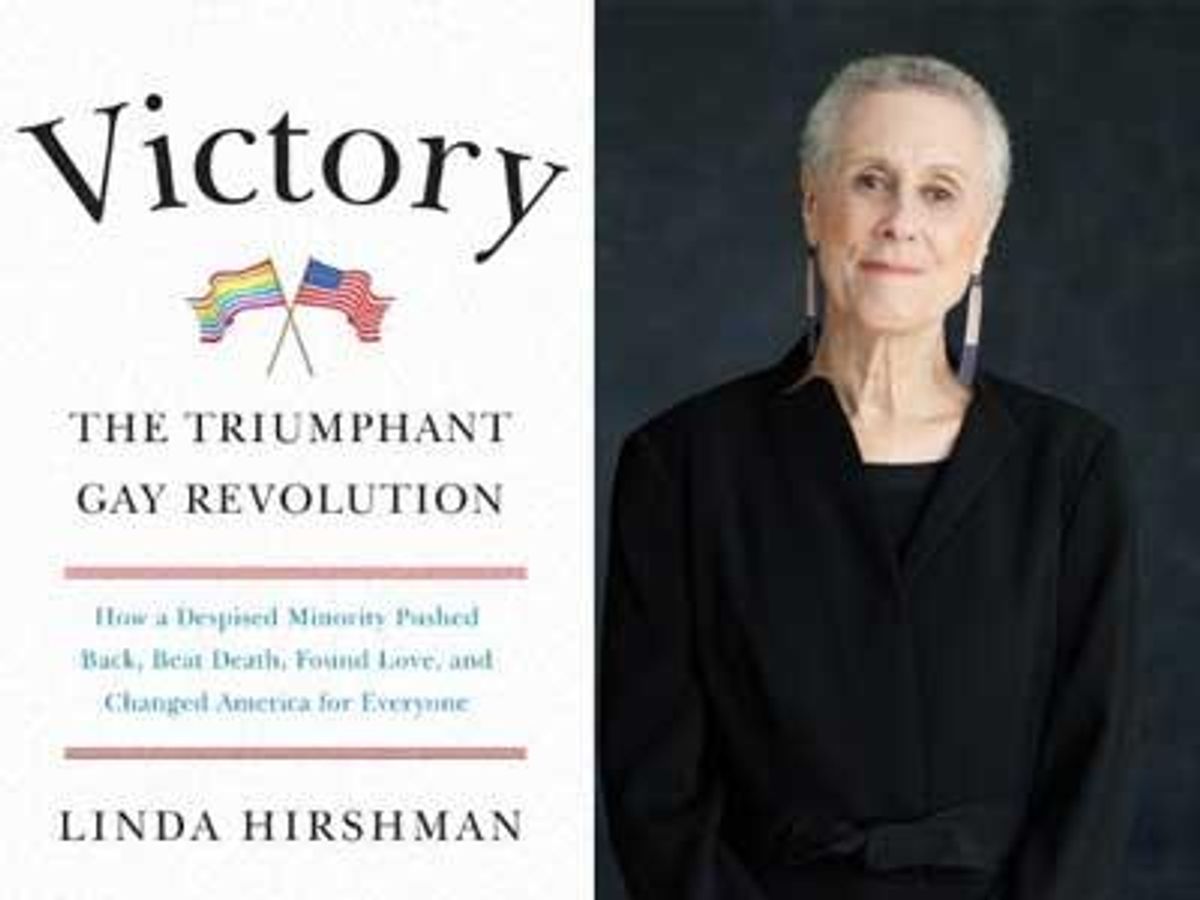Ever since Linda Hirshman -- an author, former labor lawyer, and current political columnist -- released her tome earlier this month on the LGBT civil rights struggle, VICTORY: The Triumphant Gay Revolution, reaction has been swift and mostly rapturous. Hirshman claims in the book that the main hurdles to full gay equality have mostly been knocked down, crediting notables like Harry Hay, Del Martin, and Phyllis Lyon for helping us get so far, so fast. VICTORY starts at the beginning of the 20th century, when gays and lesbians flocked to America's cities and were viewed as deranged perverts worthy of the sanitarium, or worse. The book ends in 2011, with New York legalizing same-sex marriage and the end of "don't ask, don't tell." In the first of a short series with Hirshman, we asked her about some of VICTORY's claims and the victories yet to be won.
The Advocate: The common assumption is that the gay rights movement began with New York's Stonewall riots in 1969, but you suggest American gay liberation first formalized with the creation of L.A.'s Mattachine Society in the early 1950s. Does Harry Hay and his California counterparts get short-shrift from LGBT historians?
Hirshman: I don't think it's the professional historians; but in popular culture Stonewall is much easier to frame for pop culture. It was a riot, like the '60s, manifestos, like the '60s, a liberation front like the '60s and then a march like the '60s. What people miss is that many of the people who made Stonewall found political community first in the N.Y. Mattachine -- Rodwell, Wicker, Fouratt, even Leitsch -- and that Mattachine was created by Hay from NOTHING! It's the creation of something from nothing we call oppositional consciousness, that is the truly revolutionary world altering event.
There's so much myth involved with Stonewall, including the belief that Judy Garland's death contributed to the patrons' anger. You don't mention Garland's death in your account of Stonewall. Is that because it really was inconsequential?
The people who David Carter found -- and his history is the best, most reliable history -- almost without exception denied the Judy Garland thing. I actually sympathize with Garland, queeny culture, the whole alternative mindset thing. And I picked up Bea Lillie, the '30s Garland, from Jeb and Dash (from the book Jeb and Dash: A Diary of Gay Life 1918-1945). But if the people who were there adamantly deny it, it's irresponsible to propagate it just because it makes such a great story. I think Stonewall was a lot more like the antiwar movement than like a bunch of screaming Judy Garland fans. Serious business, Stonewall.
Even though gay riots occurred in San Francisco and Los Angeles previously, Stonewall stood out because of the continued resistance and the media attention that it received. But it really seems that Stonewall's reputation as a turning point in history was cemented when the one-year anniversary march was initiated in 1970. Would Stonewall have had such an impact without the march?
No. That is one of the most important aspects of the history I describe. Everyone talks about Stonewall and everyone talks about the march, but only some obscure academic writing makes the connection. The march was a brilliant piece of political theater. Maybe it takes a political philosopher like me to recognize its impact. But my goal in the book is to bring academic insight -- my own and others' -- into popular history so people can understand not just the existence but the MEANING of this great movement. The march had everything -- pageantry, national ambition, outing, crowd psychology, simplicity, existence precedes essence.
The Gay Liberation Front was an early radical LGBT rights group that likely dissolved because of disagreement over whether the group should financially support the cause of outside groups like the Black Panthers. You suggest at that point it didn1t behoove gay groups, which were almost exclusively white at the time, to reach outside their concerns. Why?
The Black Panthers weren't a gay group. I would never assert that the movement should have been all white. If there were gay people who weren't white and wanted to take up gay rights, bravo. But for a new movement, with no power, to take up every appealing cause, like racial justice or global warming, is suicide. Indeed, for any movement without power, like feminism after decades of backlash, to take up everybody's cause is suicide. Why? Because you don't have much and you spend it on others. Result? You're still impoverished. And you don't get much from the other group you're supporting because you don't have much to trade. And you only attract people who care about both causes; you don't attract people who care about the other cause.
You say how the gay movement has accomplished more in a shorter time than the African-American civil rights movement and the feminist movement. It's a big question, but can you explain why that's the case? Does some of it have to do with the fact that much of gay liberation happened in the communication age, and in the 1990s we had the benefit of the Internet?
I say it accomplished more because it came from such a terrible disadvantage -- criminal by definition, crazy by definition, sinful, subversive. There was no room for an argument separating difference from character like MLK made, because difference was character. Also, women were numerous, African-Americans had a long moral tradition dating back to abolitionism. The gay revolution had neither of those huge advantages. On the other hand, it is true that ultimately it's easier for straight white men who run the place to yield a bit to gay white men, compared to, say, the long history of racial privilege and the need for economic justice to rectify racial injustice to say nothing of how you cannot move to the suburbs and get away from your wife. So in a material sense it was easier. But in a moral sense it was harder.
Stay tuned for more on VICTORY.



















































































